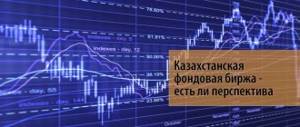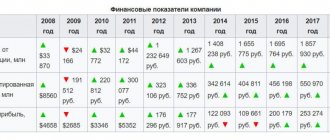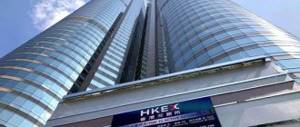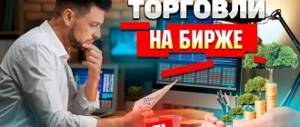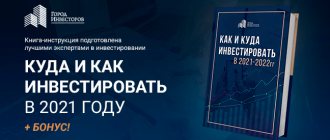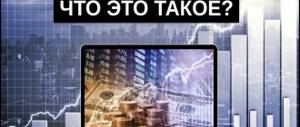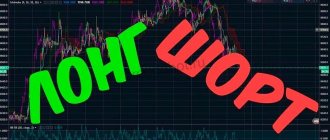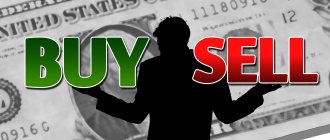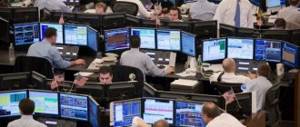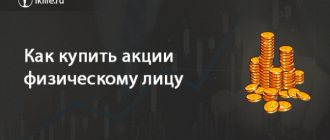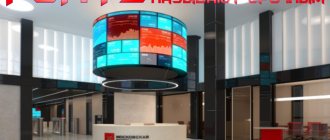The stable German economy, although not showing explosive growth, demonstrates self-confidence and declares independence from external borrowing. The desire to focus on internal tasks is being successfully implemented by the government. This set of factors could not but have a positive impact on the country's stock quotes and stock indices. As a result, German stocks arouse genuine interest even among a novice investor.
Briefly about the Frankfurt Stock Exchange
| Name | Borse Frankfurt (FSE) |
| A country | Germany |
| Official site | https://en.boerse-frankfurt.de/ |
| Year of foundation | 1585 |
| Owner | Deutsche Börse Group AG |
| Number of traded companies (as of 08/21/18) | More than 1000 |
| Other tools | Bonds, ETF/ETP, funds, commodities, currencies, notes |
| Indexes | DAX, Euro Stoxx 50, DAXPlus, Cdax, DivDAX, LDAX, MDAX, SDAX, TecDAX and VDAX |
| Capitalization | $1.9 trillion. |
| Working hours according to Moscow time | 11.00-19.30 |
Types of income from shares
The main type of profit, which logically follows from the very definition of securities, is the receipt of dividends based on the performance of the issuing company. For those who do not want to take risks and are ready to receive a stable, but relatively low income, it is better to choose shares of German companies that form the value of the DAX index.
The correctness of such investments is confirmed by the growth statistics of these companies over the past few years. After a slight fall in 2021, the DAX regained its previous positions and continues to grow in 2021.
Buying shares for long-term ownership is not the only way to make money in securities. Along with this, there is the practice of obtaining income from the resale of shares based on fluctuations in their price in the short term.
Factors influencing exchange demand and the price of company shares
In the case of purchasing shares in order to make money on their resale, not only the stability of the company’s economic position is important, but also data on changes in market conditions, insider information, foreign policy news and similar facts.
It is necessary to constantly remind yourself that stock prices are always very sensitive to news in the field of geopolitics, sudden domestic changes and even adverse climate events. When it comes to agriculture, news of prolonged rainfall or sudden frosts can reduce or even collapse the price of shares.
History of the exchange
The roots of the Frankfurt Stock Exchange go back to medieval trade fairs of the 11th century, although some historians point to the 9th century as the beginning of organized trading. In the 16th century, Frankfurt developed into a wealthy and vibrant city with an economy based on trade and financial services.
In 1585, an exchange was created to establish fixed exchange rates for currencies, which is considered the "birth" of the stock exchange. Over the next centuries, Frankfurt developed into one of the world's first stock exchanges, along with London and Paris. Bankers such as Mayer Amschel Rothschild and Max Warburg had a significant influence on Frankfurt's financial trade.
It was not until 1949, after World War II, that the Frankfurt Stock Exchange finally established itself as the leading stock exchange in Germany.
During the 1990s, the FSE was also the base for the New Market as part of the worldwide "dot-com" boom.
In 1993, Frankfurter Wertpapierbörse became managed by Deutsche Börse AG.
In 2021, the trading platform continues to occupy a leading position in the ranking of world exchanges. Millions of transactions in stocks, bonds, derivatives and synthetic financial instruments, currencies and gold are made here every day.
How the auction works
Trading on the Frankfurt Stock Exchange is carried out through the Xetra system. Quotes and transactions take place online, this includes tracking trading in real time and placing orders. Frankfurt trading is automated and takes place electronically.
Participants
Brokers who have received a license for financial activities on the FSE are allowed to trade on the Frankfurt platform.
Brokers include the world's largest financial institutions, including leading banks, investment funds and brokerage companies. Many of them perform the functions of market makers for individual instruments. All Russian heavyweight brokers are also present on the Frankfurt site.
Features of the XETRA system
This trading system has more than 2,500 instruments for trading, ranging from ordinary stocks to all kinds of derivatives. By logging into the system, you can trade not only on the Frankfurt Stock Exchange, but on 20 other European exchanges.
Convenient, practical, reliable - these factors characterizing the Frankfurt XETRA have led to the fact that trading systems for other exchange platforms are created on its basis.
What is Xetra
Xetra is the main trading system of the German exchange (program, software). Xetra trading technology replaced the IBIS platform on November 28, 1997.
Through its Deutsche Börse Cash Market division, Deutsche Börse AG (pronounced Deutsche Börse) in Frankfurt am Main now operates two trading platforms based on Xetra trading technology:
- Xetra (XETR) is the main market for German stocks and exchange-traded funds. Exchange commodities and notes are also traded here.
- Börse Frankfurt (XFRA) and derivatives exchange Börse Frankfurt Zertifikate AG (formerly Scoach) migrated to Xetra trading technology on May 20, 2011.
In addition, Xetra trading technology has also been used on the Vienna Stock Exchange since November 1999. In December 2010, the Vienna Stock Exchange similarly introduced Xetra on the Ljubljana Stock Exchange. Trading technology also operates on the Prague (since November 2012), Budapest (since December 2013), Irish (since 2000), Bulgarian (since 2008), Maltese (since 2012), Cayman Islands Stock Exchange (since 2013 year) and Zagreb (from 2021).
Eurex Bonds, Deutsche Börse's trading platform for government bonds, is powered by Xetra trading technology. The new generation trading system operating on the Shanghai Stock Exchange was also developed based on Xetra trading technology.
The most famous companies whose shares are listed on the FSE
The German blue chips form the DAX index value:
- Adidas
- Lufthansa
- Henkel
- SAP
- Bayer
- Daimler
- Deutsche Bank
- Deutsche Telekom
- Porsche
- BMW
- Volkswagen Group
- Allianz SE
- Commerzbank.
Economic giants and lesser-known German companies have been listed and traded on the stock exchange. If a company is based in Germany and its shares are listed on the FSE, then it is based in Frankfurt am Main.
Features of the XETRA system
You can trade on Xetra from anywhere in the world. Here are the key features of the system:
- Automatic entry of all transactions into a single register.
- Analysis of each individual sale or purchase order.
- Selection of counter orders.
- Choosing the most favorable price to obtain the greatest benefit from the transaction.
- Modular principle of software construction.
- Built-in tool for monitoring market performance - XetraObserver. It records the trader’s actions, summarizes analytics and reports deviations from standard actions.
Depository and clearing system in conducting exchange transactions
The general scheme for trading securities in all countries is the same:
- Reaching an initial agreement, signing a contract.
- Checking the provisions of the concluded contract.
- Clearing (netting of financial obligations).
- Transfer of certificates by the Central Depository.
Each step may be carried out by different companies, which increases costs and increases the likelihood of fraud. In order to ensure financial security and optimize the process, depository and clearing systems are being created to reduce the number of steps. Such companies are similar to insurance companies, since they undertake obligations to ensure settlements and timely transfer of shares, acting as a guarantor of the transaction.
How to list on the stock exchange?
The conditions for listing on the Frankfurt Stock Exchange are quite simple, but depending on the size of the company, two listing options are possible.
The first is “Standard” and is regulated by Deutsche Börse AG. The second is called “Premium”, and the governing document here is the Directive of the European Parliament, known as MiFID, “On Markets in Financial Instruments”.
Premium listing participants, in addition to matching the size of the business, must regularly conduct various educational events, conventions and meetings.
To enter one of the markets, a company must:
- Exist for at least 3 years.
- Prepare a prospectus.
- Bring financial reporting into compliance with international standards; IFRS standards (IAS/IFRS).
- The minimum market capitalization of the issuer must be EUR 1.25 million.
- The minimum placement volume is 10 thousand shares.
- Free float (number of shares in free float) at the time of placement - at least 25%.
- Six months before the listing, the company must undergo an audit and publish its results in English or German on its own website.
Features of the functioning of the stock market in Germany
Confidence in government securities in Germany is so great that the largest share of this market is occupied by the turnover of bonds. Shares are bought and sold somewhat less frequently, but even here preference is often given to either a state issuer or securities of companies from the DAX top list.
The ratio of the turnover of shares and bonds is approximately 1:10, but even in this sector the share of sales of corporate securities is too small. Up to 90% of transactions are made on over-the-counter platforms.
Such low activity is easily explained if you know that out of half a million active legal entities in Germany, only a little more than 15 thousand are joint-stock companies. But even among this number of enterprises there are less than a thousand whose shares are at least somehow quoted on the market.
Due to the availability of loans for business, entrepreneurs prefer to expand production and implement new projects by raising borrowed funds, rather than diluting the shares of their founders by issuing additional shares. Moreover, most often they are bought by foreign investors, not German citizens.
Pros and cons of the exchange
On the Frankfurt stock exchange, Xetra has established itself as a reliable and secure trading system. Its users note such advantages as execution prices in accordance with the market, low transaction costs, equality of trading participants, geographical location and anonymity of trading partners.
The main problems that were identified during the trading process were to ensure the stability and accessibility of exchange trading, scalability and long-term growth of activity in the market.
Risks for the buyer of shares
The risk of suffering from fraudulent activities when dealing with securities on official exchanges is practically zero. No matter how liberal the approach to exchange supervision in Germany, these measures are enough to cut off most of the unscrupulous traders.
The greatest risk is posed by the fact of playing on the stock exchange without having sufficiently deep knowledge and the lack of up-to-date analytics on these issues.
If a potential investor has limited access to information, then it is better to choose blue chip European companies and not participate in financial adventures or dubious projects. An additional measure to mitigate risks can be considered the choice of a reliable clearing company.
How to access stock trading
In Russia, access to trading on the German stock exchange can be obtained through almost any broker (Otkritie, Finam, Kit-Finance, BCS, etc.). The problem here is that, according to Russian legislation, this can only be done by a citizen of the Russian Federation who has the status of a qualified investor (with more than 6 million rubles in his account).
Access can also be obtained abroad: through a foreign “subsidiary” of Russian brokers Kit-Finance (Estonia), Finam (Cyprus and the USA) or a foreign broker: IB, Exante, Captrader. In any case, you will have to pay tax on the dividends. Moreover, both in Germany and in Russia.
Rick Keith Opening CapTrader Exante
The oldest Russian broker, operating since 1994. An excellent choice for those who want to connect to autofollow. Pros:
- no annoying calls with offers to spend money;
- own trading platform;
- impressive results of strategies (+74% for 2021) that you can connect to.
Of the minuses:
- no Quik.
You can read the full review here.
A good broker for a beginner. Here I hold the Russian part of the investment portfolio from an ETF from FinEx on an IIS.
The broker pleases:
- low commissions and the absence of annoying calls with offers to spend my money.
Of the minuses:
- weak personal account and inconvenient system for annual key regeneration.
The review can be read here.
Another great broker with whom I worked for more than 2 years. This is where I traded on FORTS.
Pros:
- Reasonable commissions
- Excellent personal account
- Nice free services
The downside is the broker's love of calling people trying to sell something.
The review can be viewed here.
German IB introducing broker for direct access to foreign markets. This is where my investment portfolio is located.
Pros:
- Works with Russians
- Availability of a Russian-language version of the site
- Reasonable commissions
- No inactivity fee
- Insurance under US law for $500k
The disadvantages include:
- Support exclusively in English and German
- The support service itself is poor
For a detailed review, see this post.
Another interesting broker for going abroad, and not from the IB family. Unfortunately, contracts are opened for Russians only in Cyprus.
Pros:
- Acceptable commissions
- The fact of successful verification of work by the SEC
- Russian-language website and support
On the downside:
- Cyprus jurisdiction
- Inactivity fee
Read a detailed review here. You can get a $500 bonus when opening an account here.
A Caution About Binary Options and Forex
Please note that under the guise of trading stock exchange instruments in Germany, including company shares, scammers offer binary options. Be careful, they have nothing to do with the securities market. This is a regular casino. Just like stocks are not traded on Forex because it is an interbank foreign exchange market. In addition, it is poorly adjustable.
Shares can only be accessed through a licensed broker.
System of state regulation of the German stock market
Due to its limited distribution and lack of mass participation on the stock market in Germany, control over the activities of exchanges and non-exchange platforms is relatively weak. But this does not mean at all that government agencies turn a blind eye to everything.
According to German legislation, the securities market is regulated in four stages, each of which is carried out by an entity at the appropriate level:
- The Federal Agency for Supervision reports to the Ministry of Finance and audits all domestic trading operations, monitors the financial reporting of exchanges and the level of capitalization of banks, and also participates in solving problems of international cooperation. To assist the agency, the Securities Commission carries out activities to supervise compliance with the law and prevent collusion among traders.
- Institutions for supervision of the activities of exchanges exist in each constituent entity of the Federal Republic of Germany (state), on the territory of which the site operates. They are responsible for monitoring internal operations, issuing for the opening of exchanges and their liquidation.
- Intra-exchange level. Monitors the accuracy of quotes and compliance with established rules.
- Banking control involves measures to maintain trade secrets, audit of transactions with currency, securities, precious metals and funds. These services are also responsible for monitoring the behavior of their own employees, their accounts and changes in property status.
Exchange indices
The main indices at Börse Frankfurt are the well-known DAX and its derivatives DAXPlus, Cdax, DivDAX, LDAX, MDAX, SDAX, TecDAX and VDAX.
DAX quotes provided by TradingView
In addition, the exchange calculates the key indicator of the entire European economy, Euro Stoxx 50, in 5 currencies at once.
Derivative "DAXs" mainly include companies from one of the economic sectors.
TecDAX consists of 30 high-tech companies whose shares are the most liquid. In particular, firms such as ADVA Optical Networking and Quality Service Communications AG (QSC), as well as software developer Software AG, are included here.
Useful articles
What are index funds and how to buy them?
25 Habits That Separate Rich People From Poor People +12 Things That Are Keeping You From Getting Rich
Review and reviews of 12 ETF funds from FinEx on the Moscow Exchange
Personal example: how to ensure a comfortable old age?
MDAX represents companies that follow the top thirty in liquidity. When calculating this index, the indicators of 50 issuers are used. In particular, this includes such well-known brands as Hugo Boss AG, Metro AG, Puma SE.
The SDAX index is calculated based on the value of shares of companies of the first group, which occupy places from 81 to 130 in terms of turnover on the stock exchange. Here you can find such famous brands as Tom Tailor Holding AG, Bauer AG and so on.
HDAX is a broad index that includes companies regardless of their industry. This includes firms represented in the indices described above. Among the companies we can note, for example, BB Biotech AG (works in the field of biotechnology) or Q Cells GMBH (produces solar panels).
The CDAX index is also a composite index. It includes more than 300 companies that represent the first and second listing groups. Thanks to this, this index can be considered as an indicator of the “health” of the German economy. It brings together companies from various fields, including automakers (for example, Volkswagen AG), banks (Commerzbank AG) and others.
Vinculation of shares as a way to limit their transfer
Germany has retained the practice of issuing bearer shares, the path of which from owner to owner is almost impossible to trace to the end. The circulation of a large volume of such securities poses a potential danger for the company, because it is unknown who will become a shareholder of the company in the end. However, it is precisely these shares that are most convenient for trading due to the ease of transfer of rights.
Those companies that do issue unnamed securities can use this method of limiting their resale, such as vinculation. This process means that bearer shares are actually converted into registered shares by recording the name of the current owner on them.
Accordingly, from this moment on, when attempting to resell the securities, a notarized re-registration and change of the inscription, and sometimes the consent of the issuer, will be required.
Prospects for investing in indexes
An index is essentially a virtual portfolio of stocks. However, for an investor to collect it in the same proportions that are used to calculate the index, significant capital will be required. Therefore, large investment companies create investment funds that copy the index. They form a portfolio of stocks included in the index. Investors can then buy shares in this fund (mutual fund, ETF). This is the only way to invest in an index for the long term.
You can’t just go out and buy an index; it’s virtual and not for sale. But, you can buy a derivative instrument that is based on it - for example, a futures or an option. Both are sold only on the stock exchange; no forex/binary options have anything to do with this.
These two instruments are time limited and typically expire in 3 months. Therefore, they are used only for buy-sell speculation or hedging. Theoretically, you can make money on speculation, but not for long. Therefore, I advise investing for 3 or more years in ETFs and diversifying your portfolio, including with different instruments.
Differences in forms of issuing shares in Germany
Even at the stage of forming initial capital, German companies are determined by the form of shares they issue. There are two mutually exclusive options:
- nominal (Nennwertaktie) – the value of each security is expressed in one or more euro units, the right to vote in the management of the joint-stock company is determined based on the nominal price;
- piece shares (Stückaktie) – are a document giving the right to a relative share in the authorized capital, proportional to the number of piece shares purchased. This indicator is not recorded in monetary terms.
Interesting facts about the exchange
Loading …
In the early 2000s, the owners of the German stock exchange considered the possibility of merging with the London Stock Exchange, which would allow the combined platform to become the third largest in the world in terms of capitalization.
After unsuccessful negotiations, the Germans made a similar proposal to the French exchange EuroNext. At first, the parties could not agree on the price of the transaction, then the New York Stock Exchange NYSE became involved in the process.
It bought the Europeans for almost $10 billion. Having suffered another setback, the owners rushed and bought the SIX Swiss Exchange. This practically did not increase the scale, but it made it possible to spread Xetra beyond Germany.
Advantages and disadvantages
The advantages of the stock market include a huge number of highly liquid securities, which opens up opportunities for both long-term investments and short-term speculative play. Moreover, with a sufficient amount of capital it is possible to play both roles.
True, taxes will have to be paid at German rates - both for dividends and on profits. This is perhaps one drawback of the Frankfurt stock exchange for investors and speculators from Russia.
Results
The stock exchange in Frankfurt is one of the oldest and largest exchanges in the world. It allows you to carry out transactions for the sale and purchase of not only securities and currency, but also goods for various sectors of the economy, including contracts for the supply of electricity. Today FWB accounts for 90% of trade turnover in Germany. Its members include almost 1,000 largest concerns. The share of foreign companies in this list is almost half. But to enter the market, you will have to spend a lot of money and time. To begin with, the candidate must show that the work of the enterprise, its development and reporting are absolutely transparent and open to the public.
And do not forget that the work of the exchange is regulated not only by the documents of its owner, but is also subject to the requirements of the European Union, the requirements of which will also have to be observed.
European marketplaces with a German division
Platforms that pay special attention to sales in Germany, having both local divisions and fully adapted websites in German. In some of them, for sales, it is enough to have a registered legal entity in the main country of operation of the marketplace; in some, it is necessary to have a company or division registered in Germany.
Fashion platforms
| asos.com | Great Britain |
| brandalley.com | Great Britain |
| spartoo.com | France |
| videodressing.com | France |
| www.laredoute.fr | France |
| vestiairecollective.com | France |
| veepee.fr | France |
Multi-category (with a wide range)
| fruugo.com | Great Britain |
| manomano.com | France |
| carrefour.com | France |
| clasohlson.com | Norway |
| fyndiq.se | Sweden |
| coolshop.com | Denmark |
Profile
| notonthehighstreet.com | Handmade |
| abebooks.co.uk | Books, accessories, stationery |
| chrono24.co.uk | Watches and accessories |
| vidaxl.com | Products for home, garden and vegetable garden |
| feelunique.com | Cosmetics |
| backmarket.com | Refurbished Electronics |
Local marketplaces in Germany
Created and mainly focused on the domestic market, with an additional share of sales in Austria and Switzerland.
A wide range of
| baur.de | meinonlinelager.de |
| conrad.de | otto.de |
| crowdfox.com | pearl.de |
| fairmondo.de | hood.de |
| galeria.de | real.de |
| gebraucht.de | restposten.de |
| hertie.de | yatego.com |
Profile
| Clothing, shoes and accessories | - zalando.de - schuhe.de - otto.de - amazon.de |
| Handmade | — kulthandwerk.de — littleproductsshop.com |
| Cosmetics and care | — douglas.de |
| Jewelry and decorations | - zalando.de - douglas.de - schmuckladen.de - otto.de - real.de |
| Media, books and accessories | — weltbild.de |
| T-shirts and prints | —spreadshirt.com |
| Electronics | — euronics.de |
| Furniture and home goods | - home24.de - netto-online.de - pamono.de - gartenxxl.de |
